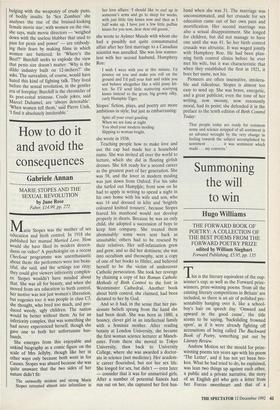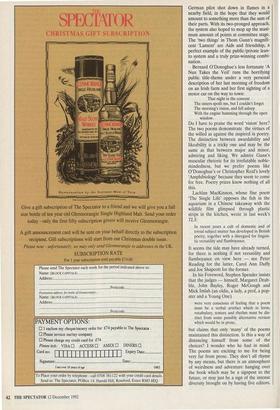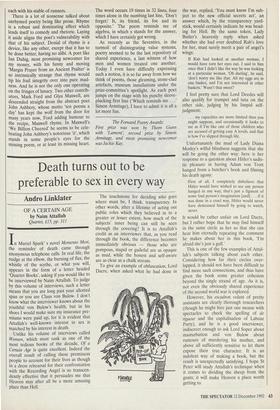Summoning the will to win
Hugo Williams
THE FORWARD BOOK OF POETRY: A COLLECTION OF THE BEST POEMS FROM THE FORWARD POETRY PRIZE edited by William Sieghart Forward Publishing, £5.95, pp. 135 This is the literary equivalent of the cup- winner's cup; as well as the Forward prize- winners, prize-winning poems 'from all the existing literary competitions in Britain' are included, so there is an air of polished pre- sentability hanging over it, like a school- boy's hair on speech day. `Onward and upward in the good cause', the title seems to be saying, `backsliding frowned upon', as if it were already fighting off accusations of being called The Backward Book of Poetry, something put out by Literary Review.
Andrew Motion set the mould for prize- winning poems ten years ago with his poem `The Letter', and it has not yet been bro- ken. What he had tried to do, he explained, was lean two things up against each other, a public and a private narrative, the story of an English girl who gets a letter from her Forces sweetheart and that of a German pilot shot down in flames in a nearby field, in the hope that they would amount to something more than the sum of their parts. With its two-pronged approach, the system also hoped to mop up the maxi- mum amount of points at committee stage. The 'two things' in Thom Gunn's magnifi- cent 'Lament' are Aids and friendship, a perfect example of the public/private lean- to system and a truly prize-winning combi- nation.
Bernard O'Donoghue's less fortunate 'A Nun Takes the Veil' runs the horrifying public title-theme under a very personal description of her last morning of freedom on an Irish farm and her first sighting of a motor car on the way to town:
That night in the convent The sisters spoilt me, but I couldn't forget The morning's vision, and fell asleep With the engine humming through the open window.
Do I have to praise the word 'vision' here? The two poems demonstrate the virtues of the willed as against the inspired in poetry. The distinction between awardability and likeability is a tricky one and may be the same as that between major and minor, admiring and liking. We admire Gunn's muscular rhetoric for its irrefutable noble- mindedness, but we prefer poems like O'Donoghue's or Christopher Reid's lovely `Amphibiology' because they seem to come for free. Poetry prizes know nothing of all this.
Lachlan MacKinnon, whose fine poem `The Single Life' opposes the fish in the aquarium in a Chinese takeaway with the wildlife film glimpsed through plastic strips in the kitchen, wrote in last week's TLS:
In recent years a cult of domestic and of trivial subject matter has developed in British poetry, together with a disregard for linguis- tic versatility and flamboyance.
It seems the tide may have already turned, for there is nothing if not versatility and flamboyance on view here — see Peter Reading for the latter, Carol Ann Duffy and Joe Shapcott for the former.
In his Foreword, Stephen Spender insists that the judges — himself, Margaret Drab- ble, John Bayley, Roger McGough and Mick Imlah (an oldie, a lady, a prof, a pop- ster and a Young One)
were very conscious of feeling that a poem must be a verbal artefact which in form, vocabulary, texture and rhythm must be dis- tinct from some possibly alternative version which would be in prose,
but claims that only 'many' of the poems maintained this distinction. Is this a way of distancing himself from some of the choices? I wonder who he had in mind. The poems are exciting to me for being very far from prose. They don't all rhyme by any means, but there is an atmosphere of weirdness and adventure hanging over the book which may be a signpost to the future, or may just be a sign of the intense diversity brought on by having five editors, each with his stable of runners.
There is a lot of nonsense talked about unrhymed poetry being like prose. Rhyme is a robust and dominating effect which lends itself to comedy and rhetoric. Laying it aside aligns the poet's vulnerability with that of his subject. Denial of rhyme is a device, like any other, except that it has to be done better, having no alibi. A poet like Ian Duhig, most promising newcomer for my money, with his funny and moving `Margin Prayer from an Ancient Psalter' is so intrinsically strange that rhyme would tip his frail integrity over into pure mad- ness. And he is not the only one operating on the fringes of lunacy. Two other contrib- utors, Mark Ford and Glyn Maxwell, are descended straight from the abstract poet John Ashbery, whose motto 'ten poems a day' has kept the wolf from the door for many years now, Ford adding humour to the recipe, Maxwell rhyme. In Maxwell's `We Billion Cheered' he seems to be cele- brating John Ashbery's notorious 'it', which stands in some people's eyes for the missing poem, or at least its missing heart. The word occurs 19 times in 32 lines, four times alone in the numbing last line, 'Don't forget/ It, its friend, its foe and its opposite.' The poem reminds me of algebra, in which x stands for the answer, which I have certainly got wrong.
As recently as the Seventies, in the turmoil of disintegrating value systems, poetry seemed to be the last repository of shared experience, a last witness of how men and women treated one another. Today I even have difficulty expressing such a notion, it is so far away from how we think of poems, those gleaming, stone-clad artefacts, museum installations under the prize-committee's spotlight. As each poet jumps on the stage with his punchy sleeve- plucking first line ('Which reminds me . . Simon Armitage), I have to admit it is all a lot more fun.
The Forward Poetry Awards: First prize was won by Thom Gunn with 'Lament; second prize by Simon Armitage, and most promising newcomer was Jackie Kay.




































































 Previous page
Previous page